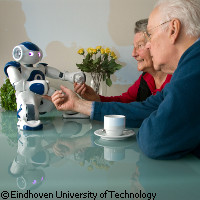Home help robot will give the elderly independence
A new EU-funded project will build an intelligent robot that operates in a 'smart home' to help elderly people secure a better quality of life and allow them to live independently for as long as possible. The KSERA ('Knowledge service robots for ageing') project has a total budget of EUR 4 million, EUR 2.9 million of which comes from the 'Information and communications technologies' (ICT) Theme of the EU's Seventh Framework Programme (FP7). KSERA got underway in February 2010 and will run for three years. The project is coordinated by the Department of Engineering and Innovation Sciences at the Eindhoven University of Technology (TU/e) in the Netherlands and brings together seven partners from five EU countries. The team says that the robot will be a 'sensible family friend' that will help elderly patients make the right decisions. KSERA will initially focus on people with chronic obstructive pulmonary disease (COPD), a disorder that mostly affects the elderly. World Health Organization (WHO) figures estimate that by 2030, COPD will be the third main cause of death worldwide. Over the next three years, the KSERA project partners will build three demonstration houses that will demonstrate what is possible in a smart home. The houses will be equipped with a robot that will help COPD patients in their daily lives. The robot will follow the patient through the house, make helpful suggestions, offer advice, learn their habits, monitor the patient closely and inform a doctor if the patient is unwell. 'We want to show what is possible in this area,' said project coordinator Dr Lydia Meesters from TU/e. Dr Meesters emphasises that the smart homes will be comfortable places to live, not cold, robot-controlled environments. 'It should be as homely as possible,' she explained. 'In an ideal situation the only technology you will see will be the robot. It will be the contact for all the domestic systems, but otherwise the place will just look very homely.' To achieve this objective Dr Raymond Cuijpers from TU/e will study robot/human communication to make it as easy as possible for a human being to understand a robot and vice versa. For the robot to be useful it must understand the patient's wishes, be intelligent and able to anticipate what the patient needs. For this aspect of the research the team will work alongside another TU/e project called RoboEarth which is building a global central memory for robots to enable them to communicate with each other and with human beings. Special attention will be paid to ethical issues such as what the robot should do if a patient lights a cigarette or how much information should be passed on by the robot to the central operating system. 'We need to define clear limits, for the robot will continuously measure and see very private data,' Dr Meesters pointed out. Other partners working on KSERA alongside TU/e are the Central European Institute of Technology (CEIT) (Austria), Vienna University of Technology (Austria), Hamburg University (Germany), Institute Superiore Mario Boella (Italy), ICT company Consoft (Italy), and Maccabi Healthcare Services (Israel). The demonstration homes will be located at CEIT and Maccabi Healthcare Services.
Countries
Austria, Germany, Israel, Italy, Netherlands



